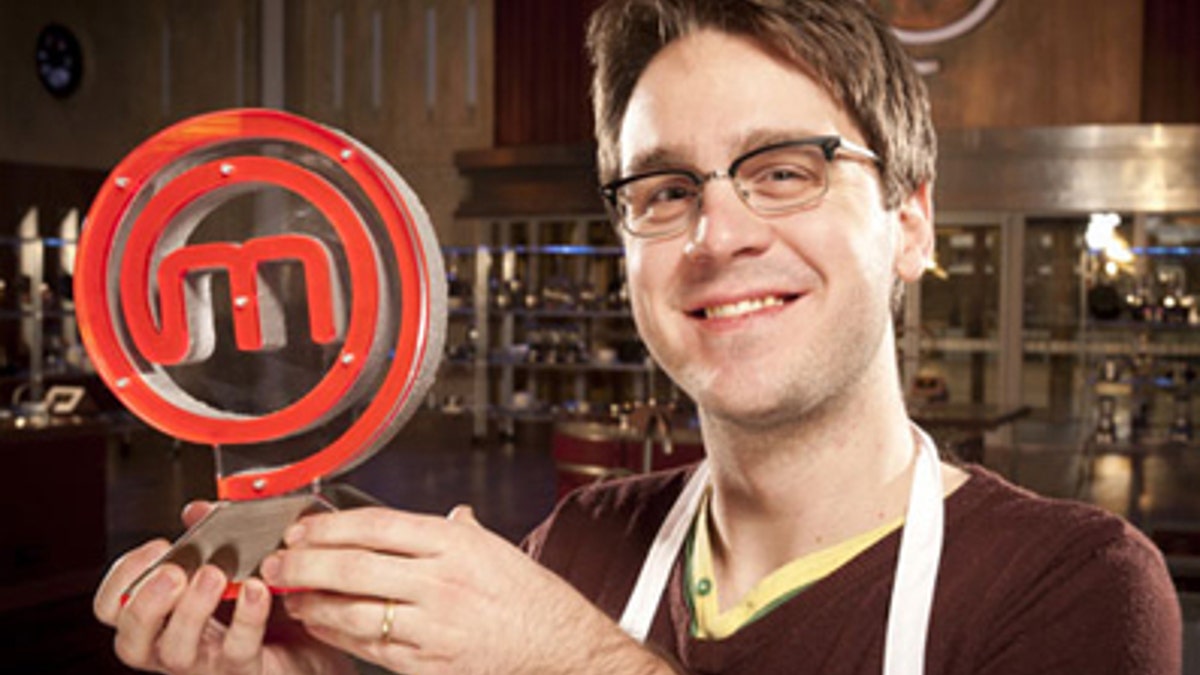
(MasterChef)
Chefs add dimension and flavor with soy sauce and red wine, and evoke the exotic with saffron and curry. Chef Tim Anderson’s inspiration is smog.
German beer and smoked salt, he says, smogged up his Los Angeles Slider of wagyu tartare with smoky lime and jalapeño marmalade and avocado and butter bean mousse. The homage to smog, Mexico and Japan was one of Anderson’s Tri-City Sliders, three burgers that helped him clinch the top spot in the BBC cooking competition, MasterChef. Wisconsin-born, twenty-six-year-old Anderson is the youngest winner ever.
The London Slider -- curried lamb cheeseburger, apple and ale chutney and raita (Indian yogurt and cucumber) mayonnaise -- referenced India’s cuisine. The Tokyo Slider -- monkfish liver, umeboshikKetchup (made from a pickled Japanese sour plum,) jellied ponzu (a citrus and soy-based sauce) and matcha (powdered green tea) mayonnaise -- reflected classical Japanese elements. “I’ve always liked monkfish liver,” says Anderson. “It’s the foie gras of the sea.”
Anderson has an uncanny ability to successfully execute bizarre pairings like Kyushu-Style Pork Ramen (pork-bone-flavored noodle soup) with Truffled Lobster Gyoza (dumplings) and Cheddar Cheesecake with Whiskey Jelly, and also reinvent classic dishes. His Croque-Monsieur substitutes chicken shank and pumpkin for the grilled ham-and-cheese original. What’s more remarkable is that Anderson has no formal training and has only been cooking for four years.
“It’s not about shoehorning flavors and dishes together, but noticing aspects of certain ingredients that are compatible, like with the monkfish slider,” he says. Blending unusual ingredients happens organically as you develop a sense for what you’re working with. It’s almost entirely intuitive and you either have it or you don’t.
“Real chefs are used to coping with tight timeframes. We don’t have the skills or the practice,” Anderson explains of the competition. Challenges included catering a wedding in hundred-degree heat, cooking in an Australian rain forest and preparing a meal for circus performers in their tent. Winners receive no prize money and no Apprentice-style job, but they can tap into MasterChef’s network of valuable contacts. And Anderson’s okay with that. “I like that no one handed me anything. My career is in my own hands.”
Two things gave Anderson an edge. A love of craft beer nurtured not in his native Racine, but in Los Angeles during college (where he also developed his appreciation for smog.) And, majoring in Japanese Studies.
Watching Iron Chef hooked a teenaged Anderson on Japanese cuisine. He found the techniques and ingredients, “pretty darned weird. You’re not going to see sea urchin, eel or monkfish liver turn up on a menu at Denny’s in Racine.” He taught English in Japan after college and got a grant to study Japan’s food museums. “Aside from its diversity, complexity and history, the Japanese take pride in their food,” he says. They’re really enthusiastic about what they serve and how they serve it. It’s infectious, he says. “Presentation to them is as important as food.” Japanese cuisine became his consuming passion, but he still had a yen for cheese and used it to woo.
“My future wife and I bonded over cheese,” he says of his British-born wife, Laura, who was also teaching in Japan when they met. Anderson brought with him some of Wisconsin’s best and it did the trick. After they married and moved to England, Anderson became a travel agent, lost his job, then worked as a rep for a Danish beer company, became a beer buyer for Whole Foods, and managed a London craft beer pub. He watched MasterChef for two years before applying. After he made the cut, he had a month to develop menus, create recipes, construct dishes and practice like a man possessed.
Anderson plans to open a private catering business in London to generate income while mastering the minutia of ordering, hiring, accounting, etc. He’ll test out new recipes, perfect his knife and butchery skills, and learn how to make sauces and pastries. After that, he’ll open an informal ramen noodle place in London that combines Japanese cuisine with American influences and good craft beer.
MasterChef develops you as a cook because they keep pushing you harder, he says. “If you don’t rise to the challenge and up your game, you won’t go very far.” And he wants to go very, very far. With that in mind, Anderson, knows that cooking, which encourages improvisation and creativity, plays to his strengths. Baking, with its precision and measurements, does not. Not to worry. “I’ll just hire a baker so I can stay passionate about what I love.”
Click here for some of Tim Anderson's recipes from MasterChef
